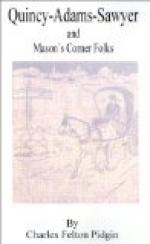“I found your names in the Quincy House register,” remarked Quincy.
“I don’t think I could escape from you as easily as I did from him,” she said, the first faint sign of a smile showing itself upon her face. “I went to my bankers in Boston and told them that I had been adopted by a wealthy French lady named Archimbault. I informed them that we were going to return to France at once. They made up my account, and I found I was worth nearly one hundred and forty thousand dollars. I took my fortune in New York drafts, explaining that madame wished to visit relatives in New York, and that we should sail for France from that port. I did this so my bankers could not disclose my whereabouts to any one. We came here, but I could not remain idle. I always had a natural taste for millinery work, so I proposed to madame that we should open a store under her name. We did this late in September, and have had great success since our opening day. Now you know all about me, Mr. Sawyer. Give me your promise that you will not tell Lord Hastings where I am.”
“Then,” said Quincy, “you do not know why I am here.”
“To keep your word to Lord Hastings, I presume. What other reason could you have?”
“Then you have not read the Personal Column in the ‘New York Herald?’” Quincy inquired.
“No,” said she. “Why should I?”
Quincy took a copy of the paper from his pocket, laid it upon the table and pointed with his finger to the word “Linda.” She read the advertisement, then looked up to him with distended eyes, full of questioning.
“What does the paper say? It could not have disclosed much or you would not have waited so long to tell me.”
Then Quincy related the story of the sealed package, how it had been given to Alice Pettengill long before Mrs. Putnam died; how Miss Pettengill had sworn to destroy it, but would not when she learned that it might possibly contain information relating to her parents. He told her that Miss Pettengill would not allow any one to read it but herself; and how he had promised to search for her until he found her. Then he related the incident at the lawyer’s office and the piece of cloth bearing the name, “Linda Fernborough,” “which,” said Quincy, “I think must have been your mother’s maiden name.” He did not tell her of the old gentleman only five blocks away, ready and willing to claim her as his granddaughter without further proof than that little piece of doth.




